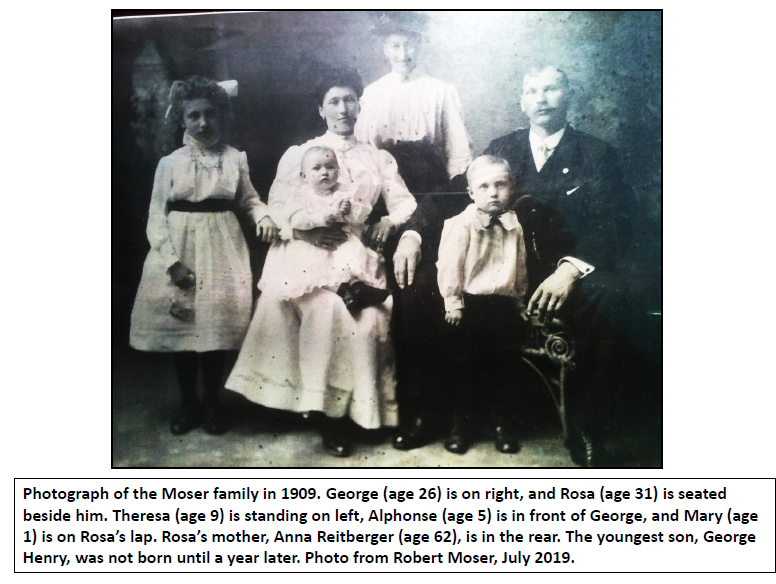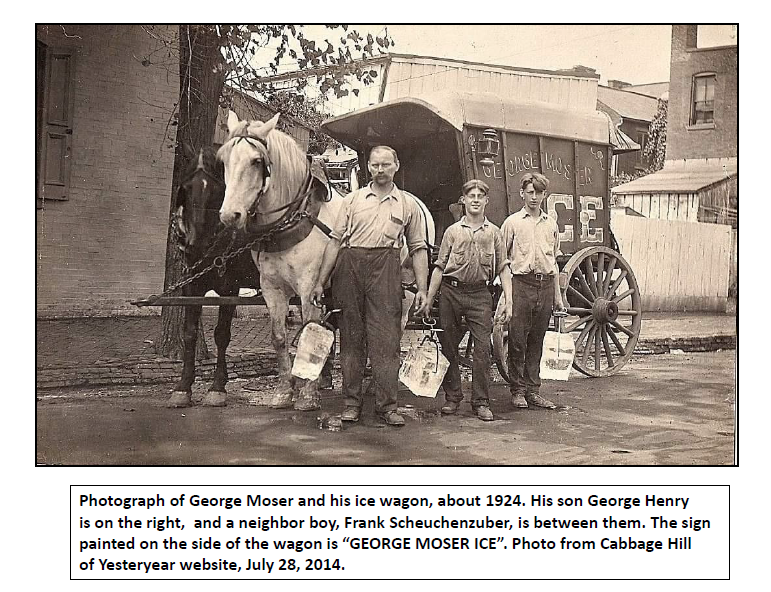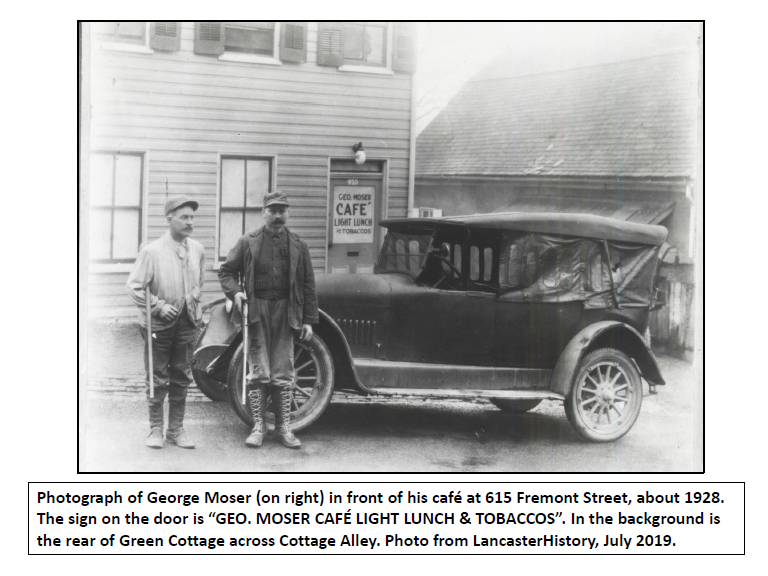Jim Gerhart, November 2019
We are all familiar with stories of immigrants who arrived in America with nothing and ended up being very successful. In fact, Cabbage Hill has had its share of German immigrants who were very successful through some combination of talent, ambition, hard work, perseverance, and luck. But no less important to the progress of the Hill were the many hundreds of German immigrants who struggled for years just to get by.
The great majority of German immigrants to the Hill in the late 19th and early 20th centuries were only able to achieve modest success, and for many, the fruits of their struggles only accrued to their children or grandchildren, who often succeeded because of the foundation laid by their parents’ and grandparents’ struggles. The small successes of these struggling immigrants, in aggregate, helped build a strong, resilient neighborhood. Their stories, as painful as some of them are, are an important part of the history of Cabbage Hill.
One such story is that of Georg Friedrich Mosser (George Moser), who arrived in New York City from Bavaria, Germany, on May 8, 1906. He was a single, 23-year-old laborer with $25 in his pocket. He was quickly processed through Ellis Island and got on a train to Lancaster, where he came to meet up with his friend Frank Bernauer on St. Joseph Street. George got a job as a laborer at a brewery, and started what he hoped would be a successful life in America.
Back in Bavaria, George had fathered two children (Theresa and Alphonse) with Rosa Reitberger, a woman five years his senior, who also had relatives and friends who had immigrated to Lancaster. A year later, in 1907, Rosa followed George to Lancaster, leaving her two young children with her widowed mother in Bavaria. On November 19, 1907, George Moser and Rosa Reitberger were married at St. Joseph’s Catholic Church.

In 1909, as they were getting settled in their new life on the Hill, George and Rosa brought daughter Theresa and son Alphonse to Lancaster from Germany, along with Rosa’s mother, Anna. One month after Anna, Theresa, and Alphonse arrived in 1909, George and Rosa bought a two-story frame house at 662 Poplar Street for $1,050. George and Rosa had two more children (Mary and George Henry) in 1908 and 1910. The Moser family unit had been established. Things were going according to plan.
George became an American citizen in 1912, and for the next eight years, he worked in various capacities at breweries in Lancaster, including laborer, brewer, and delivery wagon driver. He was arrested but found not guilty of assaulting a strikebreaker at Sprenger Brewery. He was elected vice-president of the Brewery Workers labor organization. By 1920, he was working at Empire Brewery on Locust Street.
Although George was having some success in the brewery business, he and Rosa had to borrow money several times in the 1910s, and each time they were unable to keep up with payments on the resulting debts. They were sued by their creditors and were just barely keeping up with the required payback plans handed down by judges in civil court.

Then, Prohibition took effect in January 1920, and it became illegal to make, sell, or transport alcoholic beverages. The Empire Brewery closed and George’s income from the brewery industry was suddenly gone. Out of necessity, George started his own business—peddling ice. He had a wagon and two horses (Jim and Dick) to pull it, and he and his 16-year-old son Alphonse began selling blocks of ice around Lancaster. His was one of eighteen ice-peddling operations delivering ice from the Lancaster Ice Manufacturing Company at Engleside. He ran his ice business out of the rear of the Moser house at 662 Poplar. To augment the family income, daughter Theresa worked as a weaver at the Conestoga Steam Cotton Mills on South Prince Street.
The ice business must have seemed promising. In 1921, George and Rosa purchased another two-story frame house and three lots at 615 Fremont Street for $1,500. They likely had to borrow money to make the purchase, but they must have thought the investment would pay off in the long run. When their daughter Theresa married Charles Kirchner in 1922, the new couple moved into the house on Fremont. George and Rosa continued to live with the rest of their family at 662 Poplar, and George and his son Alphonse continued to peddle ice. Soon, the youngest son, George Henry, was old enough to help in the ice business as well. Alphonse also worked for a while at the Conestoga Steam Cotton Mills, and daughter Mary took a job at the Follmer-Clogg silk mill on Manor Street to help out.
Despite all the hard work, the Mosers still struggled financially. Several times between 1920 and 1925, they were again unable to pay back various loans, and they were taken to civil court and ordered to pay off the loans, which they seem to have somehow done. Then, in 1924, their son Alphonse left Lancaster, and George lost a key pair of hands to help in the ice business. Again, out of financial necessity, George and Rosa decided to start a second new business—a café.

By 1927, they had established a café in the first floor of their house at 615 Fremont, and sold “light lunch and tobaccos”, as their sign on the front door stated. Daughter Theresa and her husband Charles continued living upstairs, and an extra room was rented to boarders. George brought on Philip Kirchner, a cousin of son-in-law Charles, to run the day-to-day café business. When Theresa and Charles moved out of the upstairs living quarters, George and Rosa rented out their rooms as well and the café became known as a hotel. George continued to peddle ice, with his son George Henry’s help, and daughter Mary continued to work at the silk mill. It seemed that George and Rosa and their family were finally going to be able to make ends meet, but things were about to take a turn for the worse.
George had purchased a touring car and in April 1927, he had a serious accident on Lincoln Highway East near Bridgeport. His car was demolished and he was taken to the hospital with what was feared to be a fractured skull, a broken jaw, and broken ribs. Fortunately, his injuries turned out to be only severe cuts and bruises. In October 1927, he had another accident in which his car was broadsided and overturned at the intersection of Manor and Filbert Streets. Again, he was not badly injured. Adding to the family’s problems, George, who had been a drinker for a long time, began to drink too much. Prohibition was in full effect, but George seemed to be able to acquire illegal beverages. In the same year, 1927, that he had his two car accidents, he was cited for being “drunk and running a car”.
Then, in December 1928, the police raided the café/hotel on Fremont and confiscated three cases of “high-powered beer”. It seems the Moser establishment had become one of the numerous speak-easies in Lancaster, and that George was manufacturing illegal beer for sale to his café customers. As a result of the raid, George was charged with violating the Prohibition liquor law, a crime that often carried a large fine and substantial jail time. A mid-January trial date was set, and George was released on $500 bail put up by his close friend and neighbor on Poplar, Albert Scheuchenzuber. But just two weeks before the case made it to trial, George suddenly died on January 3, 1929, at the young age of 45. The doctor attending him attributed his death to chronic alcoholism complicated by influenza.
Following George’s death, Rosa tried to make a go of the café and hotel business, but within a few years, the business had closed. Their son Alphonse, who had come back to Lancaster after his father’s death, teamed up with his younger brother George Henry to keep the ice business going, moving it from 662 Poplar to where Alphonse was living at 615 Fremont. This last of the Moser family’s two business enterprises lasted until the early 1940s.
In the less than 25 years since George Moser had immigrated to Lancaster, he had accomplished a lot. He had gotten married, bought two houses, raised four children, worked in the brewing industry, and started two businesses of his own. On the other hand, he had failed to repay loans, violated the liquor laws, and become addicted to alcohol. Although George’s immigrant experience was certainly not an unqualified success, he had accomplished enough to allow his four children to succeed. All four of the children of George and Rosa Moser got married and all four owned their own houses on the Hill by the 1940s.
George Moser’s story, with different details, has been repeated many hundreds of times over the years on Cabbage Hill, and the true history of the Hill cannot be told without those stories. Today, new immigrant families are creating their own stories of struggling to succeed on the Hill. A much more diverse group of immigrants are now calling the Hill their first American home, but their language, housing, and employment struggles are not all that different from those of German immigrants more than 100 years ago. SoWe is helping today’s new immigrants overcome their struggles, by trying to create a neighborhood that is safe, clean, and welcoming, and by providing services that facilitate their transition into their new community on the Hill.
Postscript: This story of George Moser and his family was prompted by correspondence with Robert Moser, Ph.D., former Executive Director of Catholic Charities, Diocese of San Diego. Bob, who was raised on Manor Street , contacted me after reading a history piece on the SoWe website, and expressed an interest in learning more about his grandfather George Moser’s business enterprises on the Hill. I thank him for allowing me to present this story of his grandfather’s immigrant experience. Appropriately enough, Bob’s position with the Diocese of San Diego involved helping immigrants—in this case refugees—start new lives in California.
